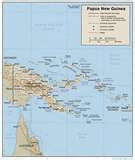200 researchers to explore Papua New Guinea's biodiversity
 How many species live on Earth?
How many species live on Earth? The answer to this question probably resides in the study of biodiversity hotspots. Six years after the Santo expedition in Vanuatu, and 2 years after the Mozambique-Madagascar expedition, scientists are once again embarking on a voyage of discovery to learn about our planet's biodiversity.
Led by France's National Museum of Natural History, Pro-Natura International and the French Institut de recherche pour le developpement (IRD), the expedition team will spend 3 months exploring Papua New Guinea, beginning in October 2012.
From the Bismarck Sea to the slopes of Mount Wilhelm, the Papua New Guinea expedition will see off nearly 200 researchers, students and volunteers.
Land expedition: the objective is to gather new data on plant and animal species distribution in the Mount Wilhelm's forests, from sea level to the tree line (altitude of about 4,000 metres).
Marine expedition: the objective is to document the specific composition of some of the planet's richest marine ecosystems, from coast to deep waters (depths of 1200 metres), using a wide array of qualitative and quantitative methods. Artificial reefs will be sunk during the 2012 expedition, and later collected in December 2013.
The National Museum of Natural History has launched a website dedicated to the expedition program. The bilingual website (French / English) will give readers an opportunity to go behind the scenes of the 2012-2013 Papua New Guinea expedition and follow scientists' daily activities through photos, news and interviews.
The 2012-2013 Papua New Guinea expedition is organized jointly by the National Museum of Natural History (Paris, France), Pro-Natura International and the French Institut de recherche pour le developpement, in partnership with the University of Papua New Guinea, the Binatang Research Center and the Royal Belgian Institute of Natural Sciences and financed by the Prince Albert II of Monaco Foundation, the Total Foundation, the Stavros Niarchos Foundation, the EDF Foundation, Entrepose Contracting, the French Pacific Fund and the government of New Caledonia.(PRNewswire/AsiaNet)


Comments